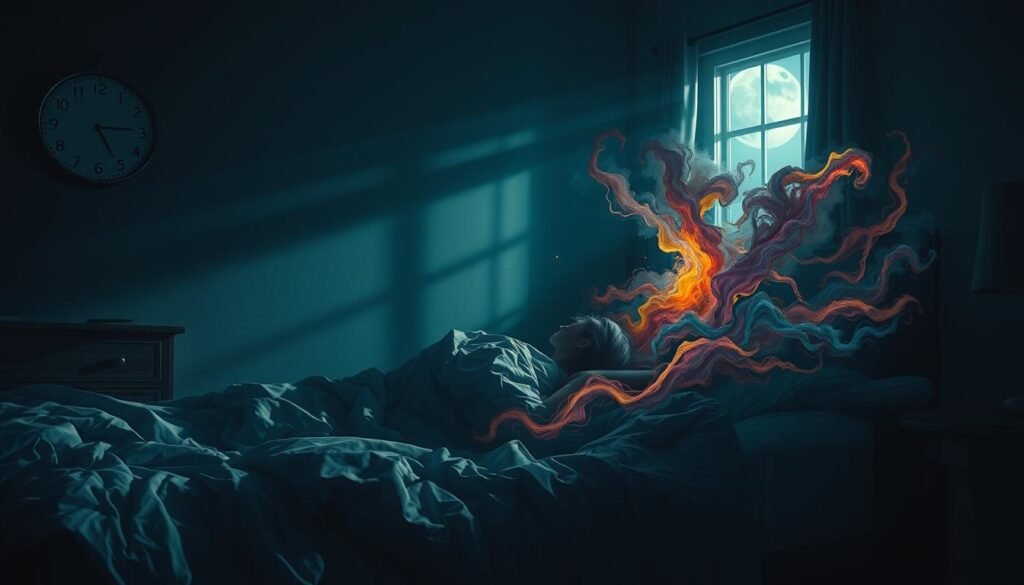About 6.8 million adults in the United States are affected by Generalized Anxiety Disorder (GAD) each year. This shows how common anxiety disorders are, affecting millions every day. Many wonder: why does anxiety make you tired? Anxiety and tiredness are connected, through both emotional and physical effects that cause exhaustion.
The aim of this guide is to look at what makes anxiety so draining. It will explore how anxiety affects both body and mind. We will give you insights and tips on how to handle these tiring symptoms.
Key Takeaways
- Anxiety affects millions of adults, leading to significant fatigue.
- Understanding the connection between anxiety and tiredness is crucial for management.
- Various factors, including hormonal changes and stress response, contribute to anxiety fatigue.
- Effective coping strategies can help mitigate symptoms and enhance energy levels.
- Professional help may be necessary for those struggling with severe anxiety symptoms.
Understanding Anxiety and Its Effects on the Body
Anxiety is a feeling many people know well, affecting about 1 in 5 American adults yearly. It makes the body react in ways that drain energy. Symptoms like a fast heartbeat and tight muscles lead to exhaustion.
Anxiety causes hormone levels to change. This can make you very uncomfortable. For instance, stress might make you breathe shallowly. This puts your body on high alert. Over time, this can hurt your health and make you feel always tired.
In the U.S., many suffer from anxiety disorders, such as general anxiety or social anxiety. These conditions touch both how we feel and our physical health. Anxiety shows its power by messing with our immune system, digestive functions, and how our bodies work overall.
Cognitive Behavioral Therapy (CBT) proves to be a good way to deal with anxiety. It teaches people to think and react differently to what stresses them. Knowing how anxiety affects you physically is key. It helps in dealing with its impacts on daily life. Learn more about the physical effects of anxiety here
The Connection Between Anxiety and Fatigue
Anxiety and fatigue are closely linked. Fatigue can be a sign of anxiety, affecting both mind and body. People with anxiety often feel tired all the time, even if they rest. They may experience brain fog, stomach trouble, and little interest in eating.
Studies show that those with anxiety might have bigger amygdalas. This makes them more sensitive to stress and fear. Their bodies react with fast heartbeats, quick breathing, and adrenaline rushes. These reactions use up a lot of energy, leading to mental tiredness.
Anxiety and stress can make people less active. This lack of activity can then reduce their energy even more. There are ways to fight this. They include getting better sleep, doing more exercises, and relaxing to manage stress. It’s also key to seek help if anxiety and tiredness are too much.

Looking into research helps understand anxiety’s effect on fatigue. Studies point to a genetic link between anxiety, depression, and being tired. Knowing how anxiety affects energy is vital for dealing with mental health and staying healthy. For further details, read this study on the relationship between anxiety, musculoskeletal pain, and fatigue.
Why Does Anxiety Make You Tired
Anxiety can make you feel really tired. This happens for many reasons, often because of hormone changes. When you’re stressed, your body goes through a lot, making you feel exhausted.
Hormonal Changes Induced by Anxiety
When you feel anxious, your body releases stress hormones like cortisol and adrenaline. These prepare you for action. But after the danger is gone, you might feel wiped out. This is because those hormones drop, leaving you feeling really tired.
The Exhaustion After Stressful Events
Even short stressful events can leave you feeling tired afterwards. The tiredness can stay around, making you feel sluggish. But, there are ways to fight this fatigue. Doing things like relaxation exercises and eating well can help you feel less tired.

| Factor | Impact on Fatigue |
|---|---|
| Hormonal Changes | Increased cortisol and adrenaline levels contribute to physical crash. |
| Post-Stressor Exhaustion | Fatigue lingers long after anxiety-inducing events. |
| Sleep Disturbances | Difficulty achieving quality rest exacerbates tiredness. |
| Coping Strategies | Engaging in relaxation techniques can reduce fatigue. |
The Role of Sleep Disturbances in Anxiety
Anxiety ties closely to sleep problems, draining your energy. People with anxiety struggle to fall asleep due to racing thoughts. This lack of sleep makes them feel more tired during the day.
How Anxiety Disrupts Sleep Patterns
Anxiety can make you worry a lot and be on edge, messing up your sleep. It’s hard to fall and stay asleep, disturbing your sleep cycles. Stress hormones increase, making anxiety and restlessness worse.
The Impact of Poor Sleep Quality on Energy Levels
Poor sleep harms your mood and energy, making daily tasks harder. About 20% of Americans with anxiety disorders suffer from conditions like insomnia. This can start a cycle of worsening anxiety and sleep troubles. Working on regular sleep habits and mindfulness can help improve sleep quality. To help ease symptoms, check out these techniques for relaxation and lifestyle changes.

Physical Effects of Anxiety on the Body
Anxiety shows up through physical signs that greatly affect our lives. Learning about the physical effects of anxiety lets us understand our experiences and their impact on health.
Common Physical Symptoms of Anxiety
Anxiety leads to physical reactions as our body gears up against what it sees as danger. People may feel:
- Racing heart: Anxiety releases adrenaline and cortisol, making the heart beat faster.
- Shortness of breath: To get more oxygen for stress, our breathing quickens.
- Chronic exhaustion: Being always on edge tires us out.
- Poor sleep: Anxiety makes it hard to sleep well, with all the worry and stress hormones.
- Achy muscles: Muscles, especially around the neck and shoulders, often tense up and hurt.
- Stomach discomfort: It messes with our guts, causing stomach aches and bathroom troubles.
- Poor immunity: Being anxious all the time weakens our body’s defenses, making us get sick more easily.
Dealing with these symptoms can make daily tasks hard. Folks struggle to handle life’s demands when they feel this kind of anxiety fatigue.
Understanding the Fight-or-Flight Response
The fight-or-flight response is how our body reacts to threats and anxiety. It changes our body in several ways:
- Increased heart rate and blood pressure
- Making our senses sharper
- Altering how we breathe, which might make us dizzy
This reaction is good in real danger, but if it’s always on, it wears our body down. Being always alert drains our energy, leading to tiredness. Recognizing these signs helps us see how anxiety changes our body and life. For help with these symptoms, check out treatments here.
Mental Exhaustion from Anxiety: What You Need to Know
Mental exhaustion from anxiety can make it hard to think clearly. It often leads to trouble concentrating and making decisions. Many find themselves in a never-ending cycle of worry. This can make you feel overwhelmed. Being always alert drains the brain, hurting your work and happiness.
A survey showed that women get tired from this more than men. Anxiety and sleep problems are closely linked. People with insomnia are much more likely to have anxiety. Good sleep habits are very important to fight mental exhaustion from anxiety.
What you eat and how much you move can affect your anxiety. Foods high in bad fats and sugar can make anxiety worse. Regular exercise helps a lot. Experts say to aim for 150 minutes of activity a week. This boosts energy and helps you feel better overall.
Sometimes, therapy like cognitive behavioral therapy (CBT) is needed. CBT teaches you new ways to deal with anxious thoughts. It helps you control your mental health better. Medicines can also help, along with therapy, for those who have a hard time with anxiety and tiredness.
It’s important to know how anxiety can tire your mind. Seeing how it affects your thinking can help you find better ways to cope. Learning and applying these methods improves your mental health. For more tips on managing anxiety, check out this link.
Are Anxiety and Low Energy Levels Interrelated?
Anxiety affects daily life, including our energy and will to do things. People with anxiety might feel too tired or unmotivated to do much. This can make them avoid activities, which only makes the tiredness worse. It’s key to see how these issues connect to get better.
How Anxiety Affects Motivation and Strength
Anxiety can make someone too tired to do everyday things. This leads to less activity, which then makes the low energy issue even worse. Here are some reasons why:
- Post-anxiety crash: After anxiety, you might feel suddenly tired.
- Mental tiredness: Worrying all the time makes you feel groggy.
- Coping mechanisms: Habits like too much sleeping can make the tiredness stay around.
- Sleep issues: Not sleeping well due to anxiety also makes you more tired.
Exercise is a great way to fight both anxiety and lack of energy. Just doing yoga once can lower anxiety and help you do more each day. Trying to sleep well and using relaxation methods like deep breathing also helps with the tiredness from anxiety.
| Factor | Impact on Energy Levels |
|---|---|
| Post-anxiety crash | Causes abrupt and severe tiredness |
| Mental fatigue | Leads to grogginess and difficulty concentrating |
| Poor sleep quality | Results in low energy and diminished motivation |
| Physical inactivity | Exacerbates feelings of fatigue and reduces strength |
Reducing anxiety and improving energy is a big step toward a happier life. By tackling these issues, people can start feeling more lively and fulfilled.
Managing Anxiety Symptoms to Combat Tiredness
Learning to manage anxiety is key to fighting off the tiredness that comes with it. Those with chronic anxiety, like Generalized Anxiety Disorder (GAD), can gain a lot from good coping techniques. This includes lifestyle changes, exercising, and practicing mindfulness to reduce anxiety naturally.
Simple actions, such as adding exercise to your daily plan, help lessen anxiety and boost your energy.
Effective Coping Strategies for Anxiety
Practices like deep-breathing, yoga, or meditation can calm the mind and body. They help relax muscles and bring about peace. Also, sleeping well is important for fighting tiredness.
Cut down on caffeine and alcohol to improve sleep and feel more awake during the day. Having strong relationships with family and friends helps with emotional health and eases anxiety’s weight.
When to Seek Professional Help for Anxiety
If self-help strategies don’t ease your anxiety, it might be time to see a professional. This is especially true if anxiety stops you from doing daily tasks or lingers despite your best efforts. A psychotherapist can offer personal treatments like therapy or medication.
These can help with anxiety and the tiredness that comes with it. Getting help early improves mental and physical health, leading to a fuller life.